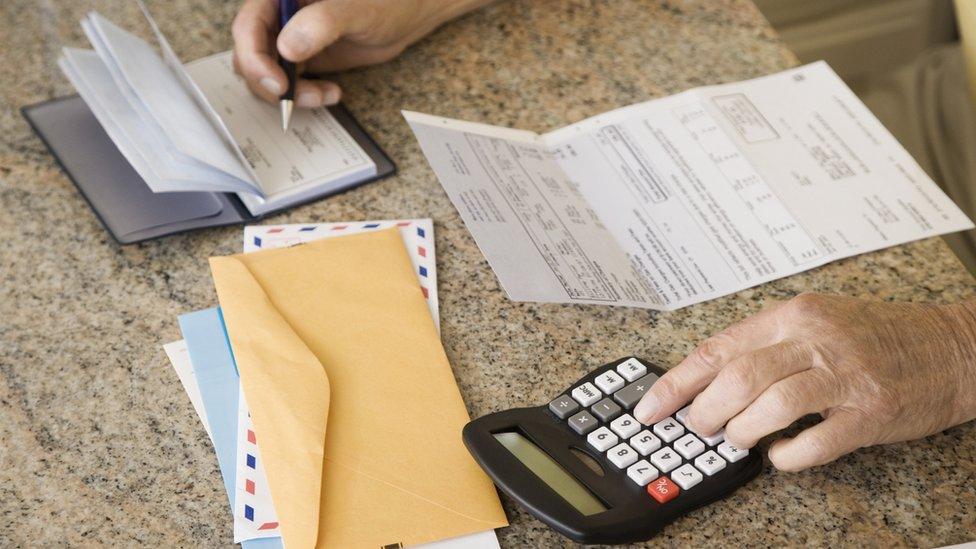We don't know how high energy bills will go, says boss
- Published
- comments

It is impossible to know yet how high household energy bills might go after the next review of the price cap, one energy boss has told the BBC.
Octopus Energy's chief executive Greg Jackson said the sector was working to "minimise cost increases".
The price cap, which sets the maximum rate suppliers can charge for a default tariff, means the typical household should pay no more than £1,277.
Some experts have said it could jump in April as gas prices continue to soar.
The new level for the price cap, which applies to England, Scotland and Wales, is due to be announced on 7 February.
Government officials have suggested that is the absolute deadline for offering fresh support for firms as costs mount.
Have your energy bills gone up recently? Email haveyoursay@bbc.co.uk, external.
Mr Jackson told the BBC's Today programme: "The reality is that in the energy sector, the UK buys most of its energy on a global market and we've had to pay about £20bn more than usual this year.
"So in one way or another, the UK's going to have to pay that money."
The government and representatives from the Department for Business have been meeting energy bosses in recent weeks to try to tackle the cost-of-living squeeze, as well as attempting to prevent more suppliers from going bust.
One option would be to subsidise the energy companies themselves by creating a fund which would allow them to draw on government cash when wholesale gas prices were very high, then pay it back when prices dipped again.
Mr Jackson pointed out that energy firms often spread costs by buying gas six, 12 or 24 months in advance in a process called hedging.
Serial entrepreneur Greg Jackson previously told the BBC the green energy firm has no HR department
But he said a fund would allow companies to "spread [costs] over a longer period of time, so we smooth the bills for customers in the UK".
He also suggested it was the job of the sector as a whole to drive down costs for consumers.
"I should say that the days of energy companies making fat profits are long gone and the entire sector is loss-making, because we're now so focused on driving costs down for customers," he added.
"That's the area where we as companies can work hard."


As the bell rings on a new year, consumers are already prepared to receive some hefty financial body shots.
Exactly how much of a stinging blow is not entirely clear as yet. But we do know the big hit will come in April, when tax increases and huge energy price rises take effect.
Even if the weather is warmer by then, most people pay their gas and electricity bills in smoothed-out monthly direct debits. The financial pain will be intense and immediate.
That is why the details of any potential support packages currently being discussed are so significant.
Those individuals and businesses already up against the ropes hope the assistance will be enough to allow them to absorb the punchy bills rather than throw in the towel.

Last month, other suppliers warned that more urgency was needed in finding a solution. Ovo Energy's boss Stephen Fitzpatrick predicted that the rise in wholesale gas prices and its impact on people would be "an enormous crisis for 2022".
And Energy UK, the industry's trade body, warned bills could soar by another 50% unless the government intervened.
Labour has urged the government to use the money raised through higher than expected VAT receipts, external, driven by the higher cost of food and energy prices, to cut household energy bills.
But a Treasury source told the BBC that rising energy bills would lead to a net reduction in VAT - not an increase.
The source claimed that with extra money spent on energy bills, where VAT is relatively lower at 5%, people would be spending less money on other goods which carry higher rates of VAT and therefore there would be a net reduction in the amount raised.
The idea of targeted financial support for fuel bills - along the lines of the current Warm Home Discount scheme - is emerging as a frontrunner, however.
The current scheme offers those receiving certain state benefits the option to apply for a one-off £140 payment every winter.
This could be increased and the number of people eligible could be expanded more broadly. Government sources confirmed on Wednesday this was "under discussion with other options" and the prime minister referred to the scheme twice in the previous 48 hours.
Liberal Democrat leader Sir Ed Davey has called for the Warm Home Discount scheme to be expanded.
Speaking to the BBC's Today programme, he said: "The Warm Home Discount, which currently is £140 to two million people, I think we should more than double that to at least £300, but increase the eligibility to seven and a half million people.
"These are people on Universal Credit, people on disability benefits, people on pension credit. I want to make sure that working-age families with children get real help with their bills."

What help is available for households?
Warm Home Discount: Worth £140 a year. It has been at this level for nearly a decade and is a one-off reduction on bills given by energy companies, although not all suppliers provide it. It is allocated on a first come, first serve basis to some low-income pensioners and younger low-income households who have to apply to receive it. Ministers plan to raise it to £150 in 2022, and extended availability to about three million households in England, Wales and Scotland, excluding Northern Ireland
Cold Weather Payment: Worth £25 for each seven days of sub-zero temperatures in your area between November and the end of March. It is available to broadly the same group of recipients as the Warm Home Discount but it is paid automatically and covers the whole of the UK
Winter Fuel Payment: Worth between £100 and £300. This is non means-tested and paid to households with at least one person of pension age (66 and above), and some younger people on legacy benefits. It is paid automatically and covers the whole of the UK

A spokesperson for the Department for Business said that the current energy price cap was "insulating millions of consumers from high global gas prices".
"We'll continue to listen to consumers and businesses on how to manage the costs of energy."
The department also pointed to schemes currently in place to help those facing high bills, such as the Warm Home Discount scheme, as well as the £500m Household Support Fund, which sees local councils distribute grants to struggling households in England.
- Published5 January 2022

- Published23 December 2021

